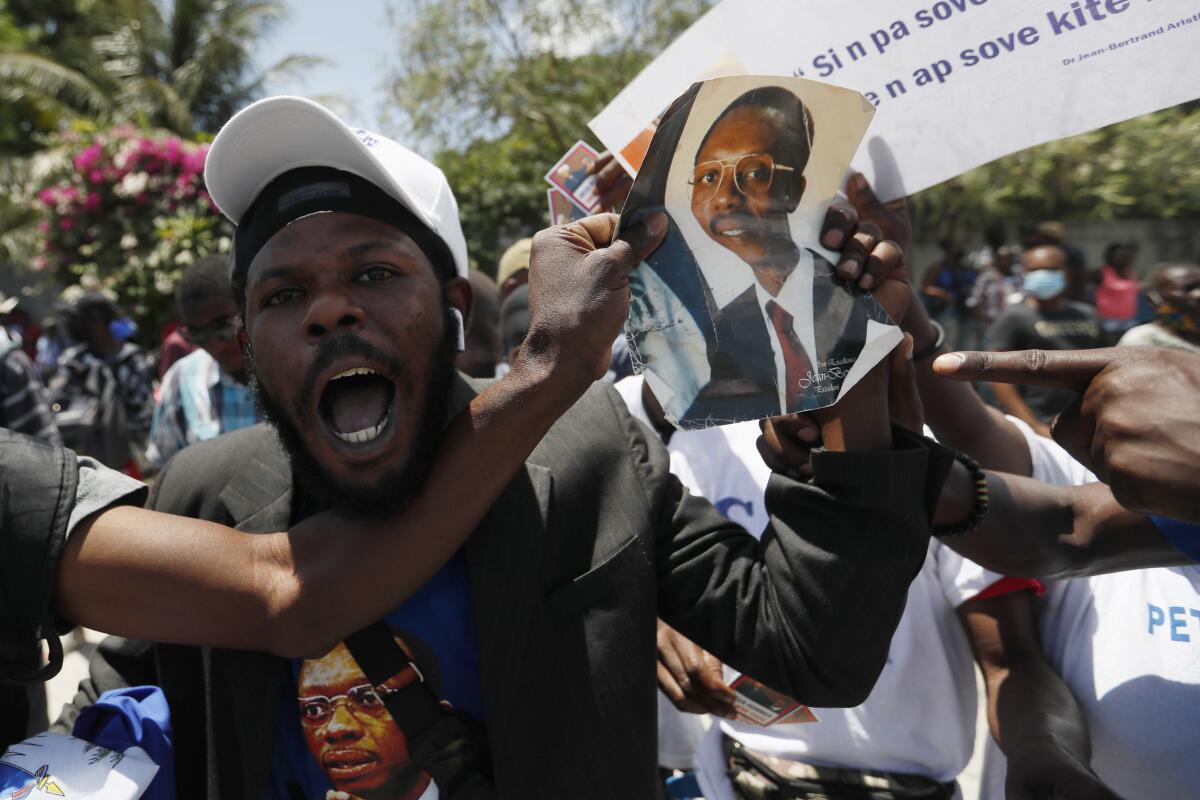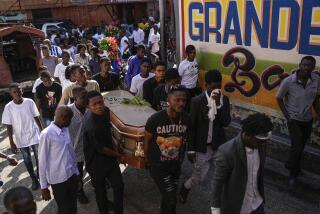Hundreds greet Aristide on return to troubled Haiti

- Share via
PORT-AU-PRINCE, Haiti — Former President Jean-Bertrand Aristide returned to Haiti on Friday after nearly a month in Cuba, thrilling hundreds of supporters who gathered at the airport amid tensions over the recent assassination of the country’s leader.
Aristide, a charismatic yet divisive figure in Haiti who was receiving unspecified medical treatment in Cuba, arrives back in a country simmering with tension over the July 7 assassination of President Jovenel Moise as new details about the investigation emerged.
Gen. Jorge Luis Vargas, Colombia’s police chief, on Friday accused a former Haitian government official of ordering ex-Colombian soldiers to kill Moise. He said Joseph Felix Badio told Colombians Duberney Capador and Germán Rivera that “what they have to do is kill the president of Haiti.”
Vargas said Badio gave that order roughly three days before the assassination during a meeting in Haiti with the two Colombians, who had been in the country since May 10.
Capador was killed in a shootout with Haitian police hours after Moise was slain. Rivera remains detained in Haiti while police are still searching for Badio, who previously worked for Haiti’s Justice Ministry and then the government’s anti-corruption unit until he was fired in May.
More than 20 suspects accused of direct involvement in the slaying have been arrested, the majority of them former Colombian soldiers. At least three other suspects were killed, and police have said they are still looking for at least seven others.
Colombia’s government has said only a small group of Colombian soldiers knew the true nature of the operation and that the others were duped.
Also on Friday, Police Chief Léon Charles said 24 police officers were standing guard when the president’s house was attacked. He said they have been interrogated and that a fifth high-ranking police official has been placed in isolated detention with four others, although none have been named as suspects.
Interim Prime Minister Claude Joseph said the government will continue to bring those responsible to justice.
“We will continue to pose questions,” he said.
Tickets for most of the former soldiers, at least, were purchased through a Florida-based company, Worldwide Capital Lending Group, Vargas said Friday.
Officials earlier said they had been bought by another Florida company, CTU Security, which allegedly recruited the men.
Worldwide issued a statement Thursday saying that it helped provide a loan to CTU but that it was meant to help finance infrastructure projects sought by Christian Emmanuel Sanon, a Haitian physician and pastor who has been arrested in the plot.
“At no time during any meeting or conversation with Dr. Sanon or with any of his representatives was there any mention, discussion or suggestion of an assassination plot against President Moise or the intention to use force to bring about a change of leadership in Haiti,” the company said.
Meanwhile, throngs of Aristide supporters cheered when they saw the former president arrive. They had arrived a couple of hours before the plane landed, holding pictures of the former priest, some saying, “The king is back!”
Aristide was taken home in an ambulance that made its way through the crowd. Some people touched the vehicle’s windows before being pushed away by police. Some supporters lingered outside after the ambulance entered Aristide’s home but the former leader did not come out and speak.
Joel Edouard “Pacha” Vorbe, an executive committee member of Aristide’s Fanmi Lavalas party, told the Associated Press that Aristide “is completely recovered,” although he didn’t have details about his condition. Neither Aristide nor the government have described the health issue.
Aristide’s return adds a potentially volatile element to an already tense situation in a country facing a power vacuum. Aristide has long been one of Haiti’s most polarizing politicians and is still popular with many.
Aristide became a global figure of resistance when, as a slum priest known for fiery oratory, he led a movement that ousted the hated dictator Jean-Claude “Baby Doc” Duvalier in 1986.
He was elected president in 1990, forced out in a military coup a year later and restored to power by the U.S. military in 1994 to serve out the remainder of his term. As a champion of the poor and advocate of leftist “liberation theology,” he was deeply hated by members of the elite.
Reelected in 2000, he was ousted four years later in a rebellion led by opponents with ties to the elite and the old Duvalierist regime. Aristide spent seven years in exile in South Africa before returning in 2011. He has largely kept a low profile, except when campaigning for his party’s unsuccessful presidential candidate in 2016.
Joseph is currently governing Haiti with the backing of police and military, although he faces growing challenges to his power.
While Haiti’s government has asked for U.S. military help, President Biden said Thursday that sending troops was “not on the agenda.” However, he said Marines would be deployed to boost security at the U.S. Embassy.
Mathias Pierre, Haiti’s elections minister, said he believes the door is still open for potential U.S. military assistance, noting that the country is in a “fragile situation” and requires a secure environment to hold elections in upcoming months.
More to Read
Sign up for Essential California
The most important California stories and recommendations in your inbox every morning.
You may occasionally receive promotional content from the Los Angeles Times.










